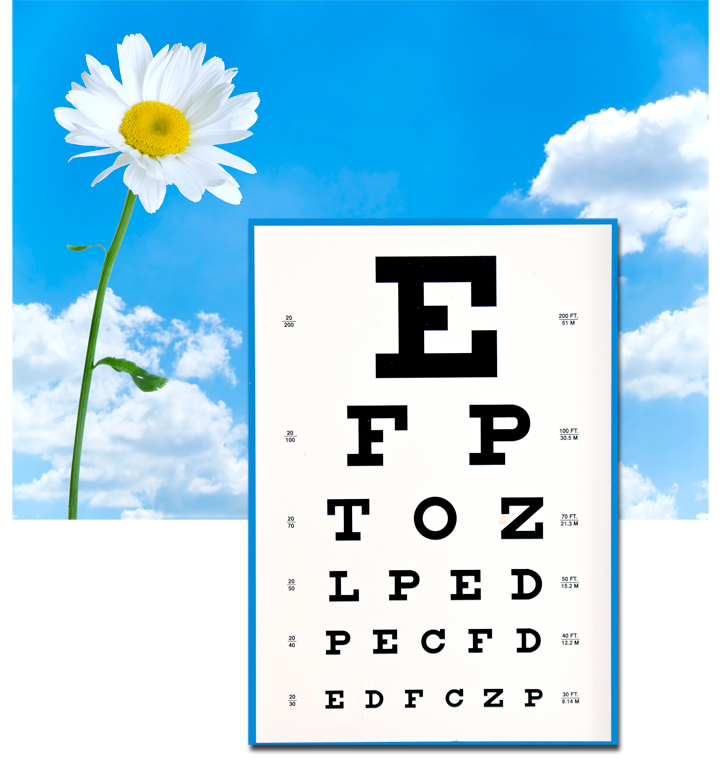Eye Health
At Lang Family Eye Care we believe the health of your eyes is very important. We are constantly reading the latest research and studying the newest equipment to be sure that we can help you take the best care of your eyes.
Why should I have my eyes examined?
To Determine the Quality of Your Vision
The obvious answer is that you may have poor vision and not know it. These are the only eyes you have and without an eye exam it's virtually impossible to know how well you see. This is especially important for school-age children. Vision problems can cause difficulties in school, sports, and social situations for adults and for children. You may be interested in our article: 8 Hidden Signs Your Child May Have Vision Problems.
Digital Eye Strain
We're all guilty of spending too much time looking at our smartphones, tablets, and computers. This often leads to digital eye strain. Symptoms of digital eye strain can include dry eyes, blurred vision, headaches or migraines, or neck and shoulder pain. If you have digital eye strain, we can help alleviate or correct these symptoms with eyewear or contacts specially designed to counteract extended time looking at these devices and screens. Read our article: How Too Much Screen Time Affects Children’s Eyes: Tips to Prevent Digital Eye Strain.
Underlying or Undetected Diseases
Just as it's difficult to know when you have poor vision, most eye diseases don’t present clear symptoms either. Usually there isn't obvious pain or change in your vision until an eye problem has become serious. You can experience permanent vision loss before you realize you have a problem.
Poets tell us the eyes are the window to the soul, but did you know it's possible to detect health issues in the rest of your body during an eye exam? With our advanced equipment, we can detect health issues such as hypertension, diabetes, cancer, and more. During your exam we look at the blood vessels in your retinas and can compare changes from one appointment to the next. This allows us to detect systemic changes that can be addressed sooner.
Age-Related Changes in Vision
For most of us, our eyes change as we grow older. Often we see a gradual change in the ability to see close up and we need reading glasses. If you are already near-sighted, you may need a periodic change in prescription to maintain clear vision. We also monitor for other age-related diseases like macular degeneration or cataracts.

How often should I have my eyes examined?
At Lang Family Eye Care we are experts in eye care for your whole family, from infants to the elderly. The following is a simple guide to the recommended frequency for your eye care visits.
School-aged children should have their eyes examined at least every year. Children don’t often know how they should be seeing or feeling while using their eyes. Having a comprehensive eye exam every year ensures he/she is set up for success in the classroom. However, a child’s eyes can change quickly over a short period of time, so if you notice any changes in your child’s schoolwork or their willingness to read and do the work; do not wait to bring your child in sooner! Read a story about one of our patients: The Case of ADHD Misdiagnosis: Functional Vision Problems Can be the Culprit not ADHD.
Adults with no vision issues, medical conditions or take no medications, and no family history of eye disease should be seen at minimum every other year to ensure the health of the eyes. Adults who wear glasses or contact lenses and adults with a family history of eye disease should be seen every year to ensure their vision needs are being met. Again, often times sudden onset of vision changes or comfort may occur and that’s when you should call as soon as possible to be seen.
If you or your child have been diagnosed with an eye disease or condition that requires extra care, then you may be directed to follow up on a schedule that is sooner then every year.

What can I expect during my eye exam?
During your eye exam, you should expect for the doctor to do a full assessment of your vision, binocularity, and eye health. Often times a technician, who assists the doctor will assess your color vision and depth perception, as well as take a measurement of the curvature of your eyes.
The doctor will assess your visual acuity (how you see with your glasses on or off), eye muscles and movements, your peripheral vision (side vision), and how your pupils react to light. He/she will also perform a refraction. This is the part of the exam that determines your glasses prescription, in which the doctor asks, “if you prefer choice 1 or 2.”
The eye health portion of the exam includes a thorough examination of all the front surfaces of your eyes, including the cornea, iris, and sclera. Your eye pressure will be measured by the iCare tonometer (no puffs of air here!). Drs. Lang always recommend dilation on the first visit. In order to dilate your eyes, the doctor will instill an eye drop. The eye drop may cause your near vision to be blurred and your eyes may be sensitive to light for a few hours following. The eye drop opens up the pupil (the black part of your eye), so the doctor can take a look inside with different lights to assess the health of the retina, blood vessels, and optic nerve.
Depending on your age, concerns, or complaints the exam will be tailored to address your specific needs. At Lang Family Eye Care, we have access to the best technology to ensure a thorough eye exam.
